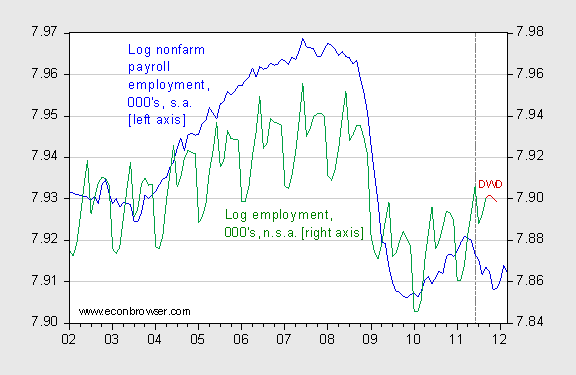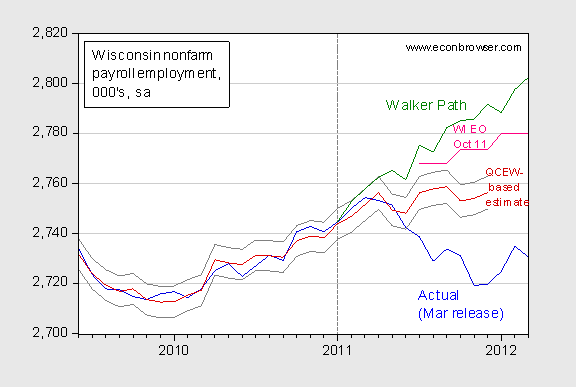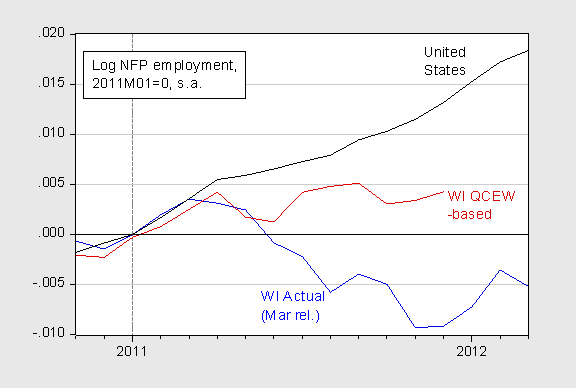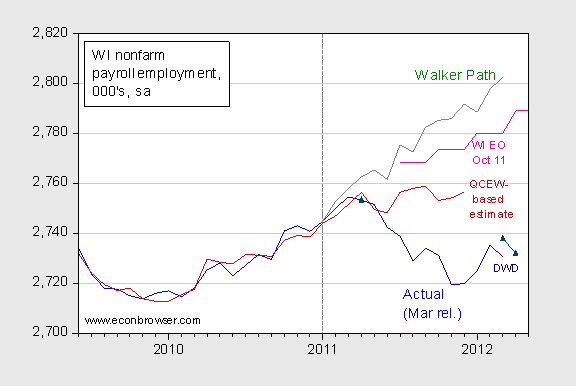(Updated at 5/17 12 noon Pacific: Wisconsin DWD reports April Loss of 5.9K NFP Jobs (6.2K Private); March NFP numbers revised up 7.3K, private payroll numbers revised up 0.7K. Total civilian employment rises by 6.8K according to household survey. Complete information at bottom of post).
Today, the Wisconsin DWD took the unusual — one might say unprecedented [1] [2] — step of announcing their estimates of what they call “actual job numbers” (see press release here). These are based on the unemployment insurance covered employment. From the press release:
Wisconsin Department of Workforce Development (DWD) Secretary Reggie Newson today released 2011 Wisconsin actual jobs data based on reports from nearly 160,000 employers, which shows the state added over 23,300 jobs between December 2010 and December 2011.
These numbers are based on the actual Quarterly Census of Employment and Wages (QCEW) through September 2011, and numbers DWD submits to BLS for processing for October 2011-December 2011. I plot this series below (along with the official BLS WI nonfarm payroll (NFP) employment series from the March release, for comparison).

Figure 1: Log nonfarm payroll employment (blue), and log employment from QCEW (green) and preliminary numbers from DWD (red). Dashed line at last benchmark date (2011M06). Source: BLS March release, and QCEW data via BLS, and DWD, and author’s calculations.
The (changes in the) “actual job numbers” are read off the green and red lines.
Obviously, there are some (serious) seasonality issues. DWD addresses this by looking at 12 month changes, which of course would be adequate had the winter been of typical severity. We know it was not.[3]
Based on my conversations with experts on the linkage between QCEW data and nonfarm payroll series, I have done my own benchmarking, taking at face value the October-December 2011 figures released by the DWD. My estimates, placed alongside the Department of Revenue’s (DoR’s) October 2011 Wisconsin Economic Outlook, and Governor Walker’s (unconditional) pledge of 250,000 additional private sector jobs are shown in Figure 2.

Figure 2: Nonfarm payroll employment from March release (blue), estimated employment (red), plus/minus two standard error band (gray), forecast from the DoR’s Wisconsin Economic Outlook, October 2011 (pink), and Walker’s path for nonfarm payroll employment implied by 250,000 target for private employment. Source: BLS, Wisconsin Economic Outlook, October 2011, author’s calculations (see text).
Procedure: I took the data on Wisconsin’s QCEW numbers, and updated to 2011M12 using “actual job numbers” reported in the DWD press release. I then ran a regression of log NFP (March release) on WI QCEW over the 2009M06-2011M06 period, seasonally adjusted over the entire sample using ARIMA X12 (arithmetic average on log series). Let nfp be log nonfarm payroll, and n be the seasonally adjusted log QCEW employment series.
nfpt = 1.99 + 0.752 × nt
R2 = 0.95; SER = 0.0011; DW = 1.51
Observations: of December 2011, implied NFP employment is 11.7 thousands above January 2011 levels. Taking into account sampling uncertainty, employment is as little as 5.2 thousand, and as much as 18.3 thousand above 2011M01 levels. The implied NFP employment is 35.4 thousand below Walker’s implied target for NFP growth, taking into account actual government employment and a smooth path for private employment growth.
One can place the revised series in a national context. Figure 3 presents a plot of the actual BLS NFP employment series, the QCEW-based series, and the US NFP employment series.

Figure 3: Wisconsin log nonfarm payroll employment from March release (blue), estimated employment (red), and US log nonfarm payroll employment from April release (black), normalized to zero at 2011M01. Vertical line at 2011M01. Source: BLS, BLS via FRED, author’s calculations (see text).
In other words, even with the numbers provided by Governor Walker’s Administration, historical correlations between the NFP series and the QCEW show a lackluster performance in the Wisconsin labor market, with employment essentially stagnant since April 2011.
By the way, other indicators suggest lackluster economic activity, so I do not understand the Administration’s assertions of growth through end-2011. The Philadelphia Fed’s coincident index indicates that economic activity was essentially flat going from 2011M01 to 2011M12. BEA also reports 2011Q4 Wisconsin total income growth placed it in 50th place out of 50 states.
Update, 12PM Pacific: Wisconsin DWD reports April Loss of 5.9K NFP Jobs (6.2K Private)
March NFP numbers revised up 7.3K, private payroll numbers revised up 0.7K. Total civilian employment rises by 6.8K according to household survey.
Note that these numbers are based on the establishment survey Governor Walker has eschewed referring to.

Figure 4: Nonfarm payroll employment from March release (blue), estimated employment (red), plus/minus two standard error band (gray), forecast from the DoR’s Wisconsin Economic Outlook, October 2011 (pink), and Walker’s path for nonfarm payroll employment implied by 250,000 target for private employment; and DWD release for April (dark blue triangles). Source: BLS, Wisconsin Economic Outlook, October 2011, DWD, author’s calculations (see text).
The BLS and Obummer lie, Wisconsin is absolutly not 50th out of 50 in jobs created since January 2011. Our great governer has personally created tens of thousands of jobs.
I’m not sure I’d do everything the way Walker has. That said, I think the coming election–from the view of a non-resident business man–is whether Wisconsin is open for business or not. If the unions win, then Wisconsin will be thought of like California without the great weather. If Walker wins, then from the investor’s point of view, then the voters are the state are signaling a willingness to work for market wages in a competitive marketplace.
Interesting perspective that cuts through the political chatter going on with both sides. Just because the rooster crows in the morning does mean he caused the sun to rise….
The data/analysis supplied is a gained perspective. However the perspective I would share is how state funded university Professors can use forums like this to express their bias views. When you look at Menzie Chinn’s bio he has 29 pages of pontifications. Assuming that some of these are income generating while on the tax payers dime. I suggest that Menzie contributes an article that offers analysis towards positive solutions than a bias to a fuel on going debate.
It seems that Walker has released the comment hounds.
Ted: You clearly have little idea of how publishing in peer reviewed journals works. Typically, we have to pay a submission fee. That is because the coin of the (academic) realm is publication. I suggest you learn something about the world before pontificating.
Menzie has done a great service here.
As Daniel Patrick Moynihan, my friend, former colleague and co-author, has written : Everyone is entitled to their own opinion, but not to their own facts.
The facts show that the WI economy is still very anemic regardless of who sits in the governors chair the end of June.
So far in the comments we have one moderate observation, but then we have some name-calling against the President, an irrelevant thinly-veiled plea for right-to-work legislation, and a personal attack against the author, none of which has anything to do with the article.
Whether Wisconsin gained a few jobs or lost a few jobs last year (which is really the only thing in dispute), Scott Walker is woefully behind on his promise of 250,000 jobs. Wisconsin, which was ahead of the curve coming out of the recovery, is now at or near the bottom in many, if not most, categories.
Obviously voters will decide whether they want a new governor on June 5th, but it’s a shame that the level of civility in this state in trying to sort out fact from fiction and come up with solutions has degraded to such a gutter level.
That fool Ted thinks we professors get paid for peer review publication. Ha ha! I’ve never heard of anything funnier or more pathetic. Do everyone a favor Ted and don’t embarass yourself. How about getting an education first and then opening your loud, raucous mouth.
‘…none of which has anything to do with the article.’
Well, duh. The facts are not what those posters want to see so nyah, nyah, nyah I’m not looking at those facts; I’m making up my own reality.
I like how the poster “I love scott walker thanks” has the email address of govgeneral@wisconsin.gov
I would think his people could find better things to do with their time.
Great job in breaking this all down for us Menzie. It’s much appreciated.
Even if Walker is right about his new jobs number, 23,300 over a year isn’t anything to be proud of. And at that rate, it will take him 11 years to reach his four year goal.
Looking at Wisconsin in context through the BLS lens, we can compare it with Illinois:
Wis. Non Farm change [Mar. to. Mar.] +24K
Ill. Non Farm change [Mar. to. Mar.] +32K
Wis. Govt. change [Mar. to. Mar.] -17K
Ill. Govt. change [Mar. to. Mar.] -10K
Wis. adjusted for government change +41K
Ill. adjusted for government change +42K
Wis. total workforce 3,064K
Ill. total workforce 6,589K
Wis. unemployment rate 6.8%
Ill. unemployment rate 8.8%
Adjusted for size of workforce, Wisconsin has produced twice the jobs of Illinois.
Looks as if Democratic Gov. Pat Quinn is really screwing up compared with Gov. Scott Walker.
Only a right-wing apologist such as Bruce ^^ could look at the LOSS of public sector jobs as a way to adjust employment numbers by ADDING them to jobs created. That is hysterical–gave me the best Orwellian laugh I have had in a while.
For God’s sake, Walker is an acknowledged liar, a Neo-Fascist, whose every word is not calculated to tell the truth but to advance his political career and the political positions of people like Diane Hendricks and the Koch Brothers.
I really cannot believe the stupidity of some Wisconsin voters. They are coming for you, folks, and you’d better get your heads on straight. Remember this. We had American citizens, innocent, working, educated American citizens snatched off the streets by the Bush-Cheney administration on suspicion of terrorism…and it turned out that there was no truth to it–after they had been torturned in an Egyptian prison. Is that what you want? Don’t say it can’t happen. It happened.
Hitler didn’t send Jews to concentration camps immediately. He did it slowly and quietly. But by the time he confiscated Austria, he sent 70,000 Austrians to camps in one week! Including the Prime Minister! You think these billionaires care for you? They are trying to get your Social Security and your Medicare right now. And Scott Walker is their poster boy.
KateN: “Only a right-wing apologist such as Bruce ^^ could look at the LOSS of public sector jobs as a way to adjust employment numbers by ADDING them to jobs created. That is hysterical–gave me the best Orwellian laugh I have had in a while.”
Actually Kate, there is nothing Orwellian about it. Government jobs take money out of the private sector… they are an economic cost… that prevent money from being invested into longer term growth. Reducing government size is a positive… especially to the extent that it improves the efficiency/”productivity” of the government sector.
Your comment leads me to believe that you agree with the economic philosophy of Francois Hollande that you can spend yourself into prosperity.
Taking some of the burden off the private sector releases money for investment and, gee, maybe jobs.
KateN:
Also, if you can’t wrap your head around the idea of adding government jobs loss to total change, think about it this way: that represents net private sector jobs added. That’s what ultimately counts.
The comments remind of the reaction to a story about how MA ranks high in income, health, and essentially all other measures of well being. And better than states with high income that don’t spend on social services. The comments tended toward: “MA has taxed so much the poor people have left.” My point is that people spout crap out of their fingers without any thought. In the case I mention, the GOP orthodoxy is of course that high taxes drive out the rich, who are mobile, with all sorts of non-statistics brought up to “prove” that point. But toss that out when it’s convenient.
And it’s always convenient to be stupid.
Jonathan: “The comments tended toward: “MA has taxed so much the poor people have left.“”
Taxes affect everyone. In some instances, where the job market is strong for higher paying workers, taxes can drive out the poorer people. San Francisco is a good example of that. There, a combination of high-paying jobs, limited space, great weather, and access to a lot of leisure activities/entertainment keeps SF inaccessible to many.
Detroit, on the other hand, is an example of high taxes and poor government combined with many alternatives for those with better paying jobs. So the city keeps its high taxes, drives out the wealthier residents, loses revenue, cuts services, watches neighborhoods disintegrate, and is left with low income residents and squatters.
But, in general, there are more places like Detroit than San Francisco and more people leaving California than moving there as Governor Moonbeam attempts to raise taxes further.
Bruce Hall You make a good argument for getting rid of state and local governments. Once again our beloved Founding Fathers have let us down.
2slug: “You make a good argument for getting rid of state and local governments. Once again our beloved Founding Fathers have let us down.”
No, it may be a better argument against a strong federal government that can box everyone in. With states able to set their own tax policies, the residents can decide if they want to elect high tax representatives or low tax representative to establish the operating principles for their state.
Thus, you get a vibrant Texas and a collapsing California. When the residents get tired of being sucked dry, they change representatives and the structure gets changed. With a strong federal government, it is much harder to have an effective voice… not impossible, but harder.
So, our founding father did not let us down, but 20th and 21st century Congresses and administrations have.
Testing
Good analysis.
Wow. I thought Ricardo was the leading idiot. Bruce Hall wins.
Gee, Jonathan and 2Slugs and KateN, those were brilliant and witty rebuttals. About what I expected.
When logic fails, nothing serves better than … ad hominem attacks? That’s all I’ve read regarding my comments. I’ve provided data and reasoned arguments. Can you do that? I can only infer… “No.”
Why are the high taxes, overbearing regulations, and statism of California better than Texas? Texas taxes less and supports business. California taxes more and drives out business. Not a problem unless, of course, a good economy and employment situation are unimportant. By the measures of employment, Wisconsin is better off than Illinois. Is that too difficult to accept? Because Gov. Walker has reduced the size of government? I can only infer… “Yes.”
Good luck in your esoteric world.
Sometimes you get back what you put out Bruce. Comparing Wisconsin to Illinois and California is irrellevant. Each state has its own geo-political obstacles it has to tackle. Wisconsin and California couldn’t have less in common. Plus you are just cherry picking blue states. Is Oregon having the same issues as CA? Massachusetts? Maryland? New York? Are Walkers right-wing policies going to send Wisconsin to the depths of a red state like Mississippi? Probably not.
Based on unemployment rates, WI has always had a better rate than IL, slashing public funds and labor had nothing to do with that. In fact, the rate changes have been pretty equal, so you could say that so far making the gov’t smaller has no effect on unemployment. You are coming to conclusions based on assumptions and hypotheticals and have pretty much earned every dissmissal of your comments.
Um, Mike… you forgot the minus sign in the Wisconsin nonfarm payroll jobs number. Let’s do the sums again but without the blatant mistake, shall we?
Wis. Non Farm change [Mar. to. Mar.] -23,900
Ill. Non Farm change [Mar. to. Mar.] +31,700
Wis. Govt. change [Mar. to. Mar.] -17,800
Ill. Govt. change [Mar. to. Mar.] -9,600
Wis. private sector change -6,100
Ill. private sector change +41,300
With correct numbers comes the correct conclusion: Walker is a walking jobs disaster.
Major Points –
– Walker was sworn in the 1st week of 2011.
– Doyle’s budget was in effect until June 30 2011.
How can Walker logically take credit for the job increase noted from Jan 1 thru April 30, 2011?????
> – The honest picture of Walker’s job record begins no earlier than May 1, 2011.
– Using a 3 month moving average basis, his job record is a total failure, down, down, down all the way and looks to be getting worse. . . . .
AND – Even more enlightening is the J-S report that the Wisconsin Government is getting larger. Walker is hiring. Could this be going on to try to boost the gross WI employed picture????
GeoffT,
thanks for the data correction.
I agree with the assessment that during Walker’s administration, employment performance in Wisconsin has remained essentially flat by losing 6,100 private sector jobs … and it is reasonable to compare Wisconsin to Illinois using change data, even if the starting values and conditions are different.
Steve Kopits,
Great comment!! I would add nothing – and should not. Adding would only reduce the brilliance.
This conversation thread has my head swimming. I’m not anti-business but I do believe they should pay their fair share of taxes. When will someone look at WI tax policy to see who the laggards are? This goes to the whole question of buying into the theory that tax breaks for the rich and big companies actually make the difference in figuring job loss/gain. I can’t believe for a minute that slashing social services and eliminating wage bargaining is a winning strategy. Maybe that’s why we can see the majority in this discussion make strong arguments–not to mention a plethora of graphs–that show Walker and the GOP agenda don’t care about jobs except when they’re running for re-election.
Bruce Hall
California’s problems were predicted 30+ years ago when Prop 13 was passed. The effect of Prop 13 was to force an ever increasing reliance on income tax revenues. In other words, utility returns from owning real property are untaxed; meanwhile utility returns from labor are heavily taxed. Should you be surprised that this leaves California with a lot of retired property owners who won’t leave the state while at the same time younger workers and businesses leave the state because of higher income and corporate tax rates? And to make matters worse, those retired property owners who are protected by Prop 13 are also the same folks who place the biggest demands on public services and oppose education for the young. The Greedy Geezers strike again! These are folks who were all too happy to take advantage of California’s generous and first-rate educational system 40 or 50 years ago, but now they want to pull up the ladder behind them. They’re all for California groaning under Medicaid for themselves (and two-thirds of Medicaid goes to retirees) but not a dime form anyone else. To paraphrase a great scientist, political economy will only make progress funeral by funeral as Tea Party voters exit the scene.
As to your broader comment, you miss the point that cities concentrate expertise and talent, and this concentration creates positive externalities. That’s why Detroit didn’t just produce one Henry Ford, but lots of Henry Fords all within walking distance of one another. That’s why Battle Creek, MI didn’t just produce Mr. Kellogg, but his neighor Mr. Post. That’s why breweries are concentrated around Milwaukee even today. There are lots of examples. Look at St. Louis. Look at Philadelphia. Look at Houston. Look at Silicon Valley. Upscale workers want to work in the high tax cities but live in low tax suburban bedroom communities. Put another way, too many of today’s middle and upscale workers want all of the benefits of big cities but don’t want to pay for the costs. Let’s face it, you’re making an argument that tries to justify freeloading. And that also gets to my (actually serious) point about abolishing state and local governments. As you inadvertently admitted, local government is all about carving out enclaves where upscale folks capture the benefits of positive externalities without having to pay for those benefits. “Free riders of the world unite!”
@Bruce Hall What the hell did you mean in that second paragraph? Not clear at all.